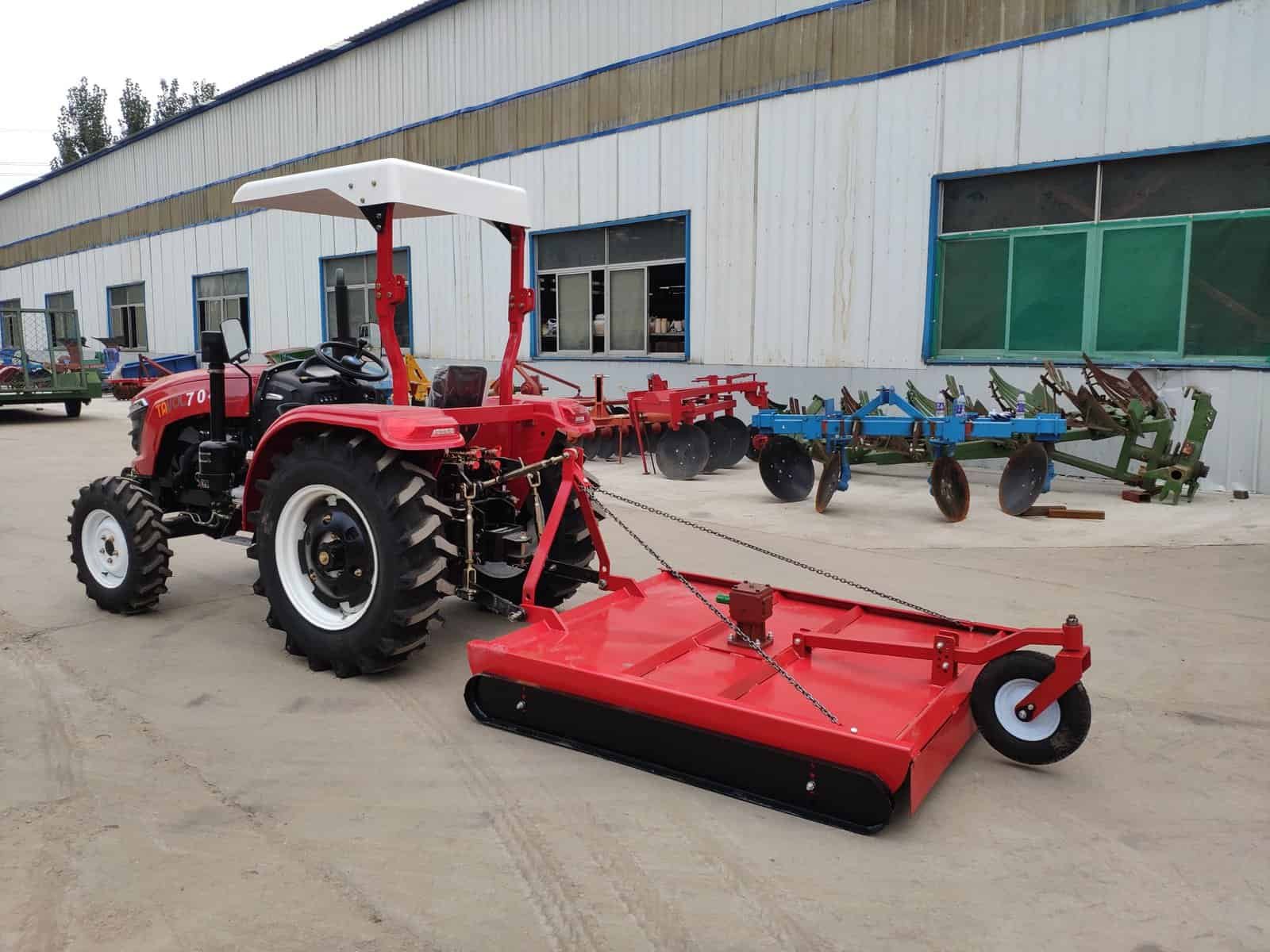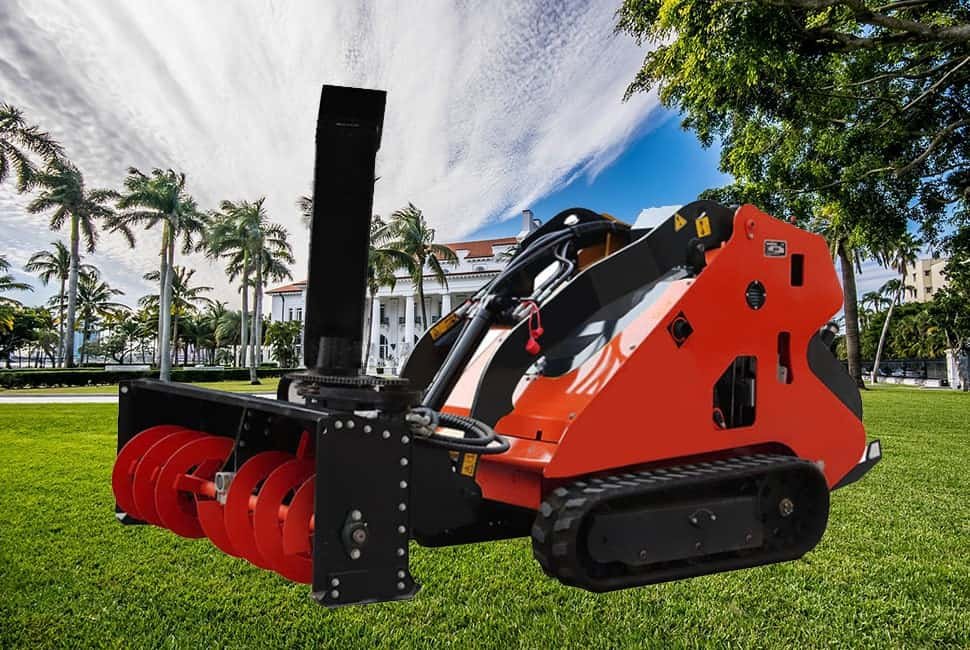Tractors are essential machines in various industries, particularly farming and construction. While most people associate them with plowing fields, their capabilities extend far beyond that. Curious about what does a tractor do? Keep reading to discover its various functions.
What Is a Tractor Used for in Farming?
Tractors are essential machines in the agricultural sector, playing a crucial role in modern farming operations. They are indispensable tools for farmers, enabling them to perform a wide range of tasks with unparalleled efficiency. From plowing fields to planting crops and hauling heavy loads, tractors have revolutionized the way farmers work, making large-scale agricultural tasks more manageable than ever before.
One of the key features of tractors is their versatility. They can be fitted with a variety of attachments, such as plows, seeders, and harrows, which transform them into multi-purpose machines. This adaptability allows farmers to use the same tractor for different tasks, streamlining farming processes and significantly improving productivity. In addition to plowing and planting, tractors are also used for mowing grass, fertilizing fields, and even irrigating crops. By reducing the need for manual labor, tractors help lower labor costs and increase overall efficiency.
Here are five common uses of tractors in agriculture:
1. Plowing Fields:
Tractors equipped with plows are essential for breaking up and turning over the soil before planting crops. This process aerates the soil, making it easier for seeds to take root and grow. By using tractors for plowing, farmers can prepare large areas of land quickly and efficiently, ensuring that the soil is in optimal condition for planting.
2. Seeding and Planting:
With the help of seeders, tractors can plant crops over vast areas in a short amount of time. These attachments ensure that seeds are distributed evenly and at the correct depth, which is crucial for achieving high yields. By automating the planting process, tractors save farmers a significant amount of time and effort, allowing them to focus on other important tasks.
3. Hauling and Towing:
Tractors are powerful machines capable of hauling large loads of harvested crops, tools, and other materials. Their towing capacity makes them ideal for transporting heavy equipment and supplies across the farm. Whether it’s moving bales of hay or transporting harvested produce to storage facilities, tractors ensure that materials are moved quickly and efficiently, reducing downtime and increasing productivity.
4. Mowing and Grass Cutting:
Tractors fitted with mower attachments are essential for maintaining grass and other vegetation on farms and large lawns. These attachments allow farmers to cut grass quickly and evenly, keeping pastures and fields in good condition. Regular mowing helps control weed growth and promotes healthy grass growth, which is important for livestock grazing.

5. Irrigation and Fertilization:
Tractors can be equipped with irrigation systems and fertilizer spreaders, making it easier to water crops and apply fertilizers. These attachments ensure that water and nutrients are distributed evenly across the fields, promoting healthy plant growth and increasing crop yields. By automating these processes, tractors help farmers manage their resources more effectively and improve overall farm productivity.
Tractors are versatile and indispensable tools in modern agriculture. Their ability to perform a wide range of tasks efficiently and effectively makes them a crucial component of any farming operation.
How Does a Tractor Help in Construction?
Tractors are not only vital in agriculture but also play a crucial role in construction and other heavy-duty industries. Their versatility and power make them indispensable tools in a variety of settings.
In the construction sector, tractors are often employed for a wide range of tasks, including hauling materials, excavating land, and leveling terrain. Their robust design and powerful engines enable them to handle demanding tasks with ease, making them essential on construction sites.
Tractors can be equipped with a variety of attachments, such as loaders, backhoes, and bulldozer blades, which enhance their functionality for construction projects. These attachments allow tractors to move heavy materials, clear land for new builds, and push dirt and debris. Whether it’s a small residential project or a large-scale commercial construction effort, tractors are particularly useful for getting the job done efficiently.
Here are five common uses of tractors in construction:
1. Material Hauling:
Tractors equipped with loaders are ideal for transporting building materials such as gravel, sand, and cement to various locations on the construction site. Their ability to carry heavy loads ensures that materials are delivered quickly and efficiently, reducing downtime and increasing productivity.

2. Excavation:
Tractors fitted with backhoe attachments are perfect for digging foundations, trenches, and other excavation work required for construction projects. These attachments provide the necessary power and precision to handle even the most challenging excavation tasks, ensuring that the groundwork is laid correctly and efficiently.
3. Land Clearing:
Before construction can begin, it’s often necessary to clear the land of trees, brush, and other obstacles. Tractors are well-suited for this task, thanks to their power and durability. They can quickly and efficiently remove obstacles, preparing the site for construction.
4. Land Leveling:
Tractors with grading attachments can help level land and prepare the site for construction or landscaping. These attachments ensure that the ground is smooth and even, providing a solid foundation for new structures. Proper land leveling is crucial for preventing issues such as uneven settling and drainage problems.
5. Transporting Equipment:
Tractors can also be used to move large construction equipment across job sites. This capability increases the efficiency of the operation by ensuring that tools and machinery are always where they are needed. By reducing the time and effort required to move equipment, tractors help keep construction projects on schedule.
Tractors are versatile and powerful machines that play a significant role in both agriculture and construction. Their ability to handle a wide range of tasks, from material hauling to land clearing, makes them indispensable tools in any heavy-duty industry.
What Are the Different Types of Tractors and Their Uses?
Tractors are not a one-size-fits-all solution. They come in a variety of types, each designed to meet specific needs and perform particular tasks. The right tractor for you depends on the type of work you need to do and the environment in which you’ll be working.
There are several categories of tractors, including utility tractors, compact tractors, and industrial tractors. Each type is tailored to different industries and tasks, offering unique benefits and capabilities.
Utility Tractors:
These tractors are the workhorses of medium-scale farming operations. They provide a balance of power and versatility, making them ideal for a wide range of tasks such as plowing, seeding, and hauling. Their mid-range size and power output make them suitable for general farming activities, ensuring that they can handle a variety of jobs efficiently.
Compact Tractors:
As their name suggests, compact tractors are smaller and more maneuverable. This makes them perfect for landscaping, small farms, or any environment where space is limited. Their compact size allows them to navigate tight spaces and perform tasks that larger tractors might find challenging. Whether you’re working in a small garden or a tight urban setting, compact tractors offer the flexibility and precision needed for the job.

Industrial Tractors:
These are the heavy-duty machines designed for the toughest jobs. Industrial tractors are built to handle demanding tasks in construction, demolition, and mining. Their powerful engines and robust construction make them capable of moving large amounts of material, excavating land, and performing other heavy-duty operations. If your work requires significant power and durability, an industrial tractor is the right choice.
Understanding the differences between these types of tractors can help you make an informed decision when choosing the right one for your specific needs. Whether you’re a farmer looking to expand your operations, a landscaper needing precision tools, or a construction worker tackling heavy-duty projects, there’s a tractor designed to meet your requirements.
How Do Tractors Impact the Efficiency of Farm Work?
Tractors have completely transformed the agricultural landscape by introducing unprecedented levels of efficiency and reducing the need for manual labor. These powerful machines have become the backbone of modern farming, making tasks that once required significant time and effort much more manageable.
By automating essential farming activities such as plowing, planting, and harvesting, tractors have dramatically reduced the time and effort needed to complete these tasks. This automation has led to a significant increase in farm productivity, allowing farmers to manage larger areas of land with fewer workers. As a result, the reliance on human labor has been greatly reduced, making farming more efficient and cost-effective.
Modern tractors are equipped with cutting-edge technology that further enhances their capabilities. GPS systems and precision farming tools, for example, enable farmers to plant crops with pinpoint accuracy. These technologies also help optimize the use of resources such as water, fertilizer, and fuel. By ensuring that crops are planted in the most optimal conditions and that resources are used efficiently, farmers can achieve higher yields while minimizing waste.
Moreover, the use of advanced technology in tractors has had a positive impact on the environment. Precision farming tools allow for more targeted application of fertilizers and pesticides, reducing runoff and minimizing the environmental footprint of farming practices. This not only benefits the environment but also contributes to the long-term sustainability of agricultural operations.
Tractors have played a pivotal role in the evolution of the agricultural industry. They have not only increased efficiency and productivity but have also helped farmers adopt more sustainable practices. By leveraging advanced technology, tractors continue to drive innovation and growth in agriculture, ensuring that farming remains a viable and sustainable industry for future generations.
Can a Tractor Be Used for Other Jobs Beyond Farming and Construction?
While tractors are primarily associated with farming and construction, their versatility extends far beyond these traditional domains. In fact, tractors can be adapted to perform a wide array of tasks across various industries and settings.
Tractors are often utilized for non-agricultural tasks such as snow removal, land clearing, and even recreational activities like lawn care and landscaping. Their robust design and powerful engines make them ideal for tackling challenging tasks in diverse environments.
Many homeowners and landscapers have come to rely on tractors for maintaining large lawns, removing snow during the winter months, or clearing brush and debris. With the right attachments, tractors can transform into versatile tools for road maintenance, forestry work, and even moving large items in warehouses. Their adaptability and power make them a valuable asset in industries far beyond farming and construction.
For example, in the winter, tractors equipped with snowblowers or plows can efficiently clear snow from driveways, parking lots, and roads. During the warmer months, they can be fitted with mowers to keep large lawns and fields well-maintained. In forestry, tractors with specialized attachments can help clear paths, move logs, and perform other essential tasks. In warehouses, they can be used to move heavy pallets and equipment, streamlining logistics and improving efficiency.
In summary, tractors are not just limited to farming and construction. Their adaptability and power make them invaluable tools for a wide range of tasks, from snow removal and lawn care to forestry and warehouse management. This versatility ensures that tractors remain a reliable and efficient choice for various industries and applications.
Tractor Landscape Rake Uses
Tractors are frequently fitted with landscape rakes, which are specialized tools designed to enhance efficiency in landscaping tasks. A landscape rake is indispensable for clearing and leveling soil, spreading gravel, and preparing land for seeding or sodding. These rakes are engineered to make the process of land preparation both quick and thorough.

The landscape rake attachment is a game-changer for landscapers, allowing them to swiftly and efficiently gather debris, rocks, and other unwanted materials from the soil. This tool is especially valuable in large-scale landscaping projects, such as those found in golf courses, parks, and expansive residential lawns. By using a landscape rake, professionals can achieve a smooth and level surface, which is crucial for planting grass, flowers, or other plants. The rake ensures that the soil is evenly prepared, promoting healthy growth and a uniform appearance.
Beyond initial land preparation, landscape rakes are also effective in maintaining roads and trails. They can remove excess dirt and debris, ensuring that these areas remain clear and safe for use. This versatility makes the landscape rake a must-have attachment for any tractor involved in landscaping work.
Landscape rakes are essential tools for tractors, providing landscapers with the ability to efficiently clear, level, and prepare land for various planting tasks. Their effectiveness in both initial preparation and ongoing maintenance makes them a valuable asset in any landscaping project, from small residential gardens to large public spaces.
Summary
Tractors are incredibly versatile machines that are essential in farming, construction, landscaping, and many other industries. From plowing fields to clearing land, their wide range of capabilities makes them indispensable for various tasks. Whether you’re working on a farm, construction site, or tackling other heavy-duty jobs, a tractor is often the solution to make the job easier and more efficient.





















